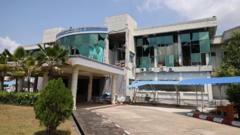Life in Gaza is increasingly bleak for both patients and medical personnel as war ravages the region's healthcare system. Dr. Wissam Sukkar, a local GP at a Médecins Sans Frontières clinic, describes the overwhelming struggle to provide care amidst dwindling supplies and rising diseases. With the healthcare infrastructure collapsing under the weight of ongoing conflict, Dr. Sukkar reveals the dire circumstances of her patients, many of whom have lost their homes and face severe health issues in makeshift shelters.
A Glimpse into the Darkness: Life and Medicine in Gaza's Distress

A Glimpse into the Darkness: Life and Medicine in Gaza's Distress
Amidst a deteriorating healthcare system, Dr. Wissam Sukkar shares the harrowing realities faced daily by patients in Gaza as war persists.
In the midst of an endless nightmare, Dr. Sukkar walks through the shattered streets of Gaza City to the Médecins Sans Frontières (MSF) clinic where she works. Starting her day at 07:30, she navigates the rubble for nearly an hour since fuel shortages have severely limited transportation options. Despite the overwhelming challenges, she is committed to serving the displaced population facing an escalating healthcare crisis as a result of 18 months of sustained conflict between Israel and Hamas.
Currently, only 21 out of 36 hospitals in Gaza maintain partial functionality, according to the UN's World Health Organization (WHO). As Dr. Sukkar arrives at the clinic, she and her team operate from a makeshift facility since their original site was destroyed in an early bombardment. By 09:30, a long line of patients waits outside; many are families crammed into shelters and tents, seeking medical attention amid scarce food and clean water.
“Most of our patients are displaced,” Dr. Sukkar notes, explaining that among them are malnourished children and individuals suffering from a slew of ailments, including viral infections and skin diseases exacerbated by poor living conditions. With cooking gas depleted, families rely on open fires for food, thus increasing burn injuries.
The number of complex and serious cases is rising, prompting distress for Dr. Sukkar and her colleagues, who often lack the necessary resources to treat their patients adequately. "We have many challenges with an increasing number of patients and depleting medical supplies," she reports with exhaustion. Recent attacks on hospitals have further endangered the healthcare system, leaving many without essential treatment options.
One patient, Saeed Barkat, arrives at the clinic after his treatment had been interrupted when al-Ahli hospital, previously a major trauma center, was bombed. Barkat, who was injured by artillery fire, expresses his concerns about accessing continued care.
As noon approaches, the pharmacy’s shelves reflect the grim situation, running low on vital medications such as insulin, fever reducers, and basic ointments for infections. With borders closed to aid since early March, Dr. Sukkar anticipates that they can only sustain the clinic for about two more weeks without new supplies.
By day’s end, nearly 390 patients have been seen, illustrating not just the demand for medical help, but the desperate urgency of the situation. Dr. Sukkar, weary and burdened, reflects on her own struggles to care for her children amid the chaos. "It’s hard to find hope," she laments as she heads home after a grueling day. In a voice thick with desperation, she asks, "When will this war end?" The darkness closes in, and for now, there are no answers or rest from the torment.
Currently, only 21 out of 36 hospitals in Gaza maintain partial functionality, according to the UN's World Health Organization (WHO). As Dr. Sukkar arrives at the clinic, she and her team operate from a makeshift facility since their original site was destroyed in an early bombardment. By 09:30, a long line of patients waits outside; many are families crammed into shelters and tents, seeking medical attention amid scarce food and clean water.
“Most of our patients are displaced,” Dr. Sukkar notes, explaining that among them are malnourished children and individuals suffering from a slew of ailments, including viral infections and skin diseases exacerbated by poor living conditions. With cooking gas depleted, families rely on open fires for food, thus increasing burn injuries.
The number of complex and serious cases is rising, prompting distress for Dr. Sukkar and her colleagues, who often lack the necessary resources to treat their patients adequately. "We have many challenges with an increasing number of patients and depleting medical supplies," she reports with exhaustion. Recent attacks on hospitals have further endangered the healthcare system, leaving many without essential treatment options.
One patient, Saeed Barkat, arrives at the clinic after his treatment had been interrupted when al-Ahli hospital, previously a major trauma center, was bombed. Barkat, who was injured by artillery fire, expresses his concerns about accessing continued care.
As noon approaches, the pharmacy’s shelves reflect the grim situation, running low on vital medications such as insulin, fever reducers, and basic ointments for infections. With borders closed to aid since early March, Dr. Sukkar anticipates that they can only sustain the clinic for about two more weeks without new supplies.
By day’s end, nearly 390 patients have been seen, illustrating not just the demand for medical help, but the desperate urgency of the situation. Dr. Sukkar, weary and burdened, reflects on her own struggles to care for her children amid the chaos. "It’s hard to find hope," she laments as she heads home after a grueling day. In a voice thick with desperation, she asks, "When will this war end?" The darkness closes in, and for now, there are no answers or rest from the torment.





















